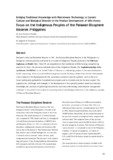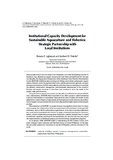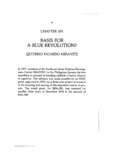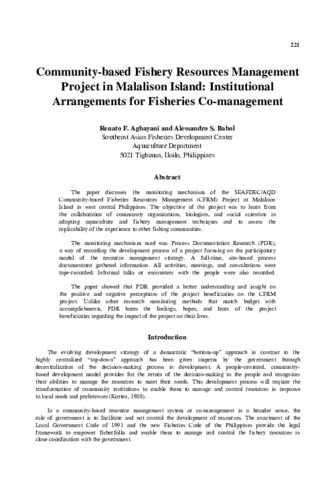Bridging traditional knowledge with mainstream technology to sustain cultural and biological diversity in the product development of wild honey: Focus on the indigenous peoples of the Palawan Biosphere Reserve, Philippines
- Global styles
- MLA
- Vancouver
- Elsevier - Harvard
- APA
- Help
Share
นามธรรม
Declared a Man and Biosphere Reserve in 1991, the Palawan Biosphere Reserve in the Philippines is a biologically diverse province and home to a number of Indigenous Peoples particularly the Pala’wan, Tagbanua and Batak tribes. These IPs are dependent on their traditional wildlife hunting and gathering practices for food. The province-wide federation of the Indigenous Peoples, the Nagkakaisang Mga Tribung Palawan (NATRIPAL) or the United Tribes of Palawan, is undertaking projects in the area of education, health, organizing, advocacy and livelihood programs towards building a better future for the tribal peoples. A key initiative is the development for the mainstream market of specialty products such as the wild honey traditionally gathered for household consumption and at a limited scale for the local market. The opportunities, challenges and strategies in the development of this specialty product based on customary knowledge and practices of gathering enhanced by mainstream technology and enterprise management scheme(s) is discussed in the context of sustaining cultural and biological diversity of the indigenous peoples of Palawan Biosphere Reserve.
การอ้างอิง
Pontillas, J. F., & Primavera, J. H. (2008). Bridging traditional knowledge with mainstream technology to sustain cultural and biological diversity in the product development of wild honey: Focus on the indigenous peoples of the Palawan Biosphere Reserve, Philippines. In Proceedings of the Joint Regional Seminar of the Ecotone-SeaBRnet 2007 and the 9th Conference of the China Biosphere Reserves Network (CBRN): Cultural Diversity - A Foundation for Biodiversity Conservation and Sustainable Development, Maolan Biosphere Reserve, Libo County, Guizhou Province, P. R. China, 7-12 November 2007 (pp. 35–40). Jakarta: UNESCO Office.
Type
Conference paperคอลเลกชัน
- Conference Proceedings [300]
Related items
Showing items related by title, author, creator and subject.
-
Institutional capacity development for sustainable aquaculture and fisheries: Strategic partnership with local institutions
Agbayani, Renato F.; Toledo, Joebert D. (Terrapub, 2008)Many people living in the rural areas in the Philippines, as in other developing countries in Southeast Asia, depend on aquatic resources for their food and livelihood. For the past two decades, the Aquaculture Department ... -
Basis for a blue revolution?
Miravite, Quiterio F. (International Development Research Centre, 1979)In 1977, scientists at the Southeast Asian Fisheries Development Centre (SEAFDEC) in the Philippines became the first anywhere to succeed in breeding milkfish (Chanos chanos) in captivity. The advance was made possible by ... -
Community-based Fishery Resources Management Project in Malalison Island: Institutional arrangements for fisheries co-management
Agbayani, Renato F.; Babol, Alessandro S. (Aquaculture Department, Southeast Asian Fisheries Development Center, 2001)The paper discusses the monitoring mechanism of the SEAFDEC/AQD Community-based Fisheries Resources Management (CFRM) Project at Malalison Island in west central Philippines. The objective of the project was to learn from ...






